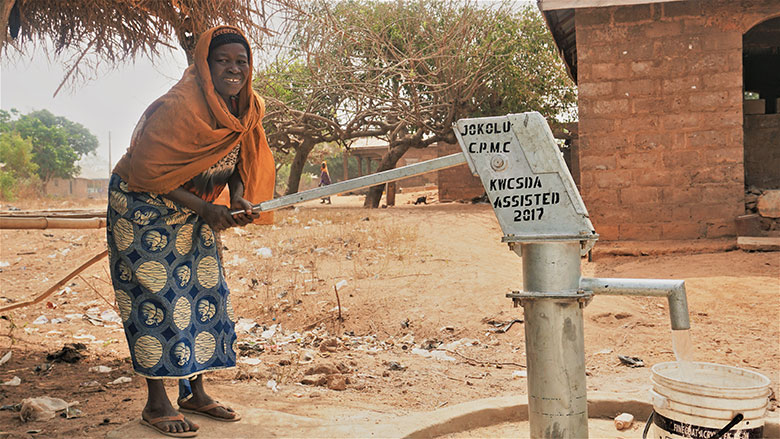ABUJA, February 16, 2018 – For 100 years, the people of the rural Igboroko-Afon community in Kwara State have lived without electricity. For young resident Tunde Rahimi, growing up there meant a lifetime without power, until the Kwara Community Social Development Agency (KWCSDA) changed that.
Through the implementation of the Community Development Plan (CDP), which includes electricity and education micro projects, the community now has access to electricity for the first time.
“Before electricity came in, whenever I went to visit friends in other towns, even though there is no place like home, coming back to my community was difficult. I always wondered if we would ever have a fridge to cool our stuff or ‘light’ to charge our phones,” Rahimi said. “Now, being able to charge my phone is no longer a luxury but something I can do in the confines of my own room.”
KWCSDA is the state-level implementing arm of the national Community Social Development Project (CSDP), a community-driven approach to development, which targets and includes poor and vulnerable groups. Supported by the World Bank, the CSDP focuses on community development and local development as a key element to the overall strategy for poverty reduction and development in the country.
The project is part of the government’s expanding social protection agenda to address increasing concern about the pervasive poverty, inequality and joblessness of poor people in the country. In recent years, the government has sought to develop social protection instruments to tackle the country’s high rates of poverty and vulnerability. The federal government is currently articulating a reform agenda for the social protection sector as a harmonized approach to tackle the current level of poverty in the country and a means of ensuring inclusive growth and poverty reduction.
Through CSDP, many beneficiaries can see changes in their communities because the community-driven approach gives development control to groups within the community. The project responds and reacts to the call of the people by enhancing the voice of the communities, their participation in resource allocation, decision making and service planning at the local level.
Aremu Olabanji, of Eleshin Meta, Kwara, lives in a community that is benefitting from a newly-constructed healthcare facility and ongoing transport project.
“CSDP is the first project through which the impact of the government is actually felt,” he said.
Muniat Isiaka of the Jokolu community no longer walks more than 1km to the nearest stream to fetch water. Because of CSDP, Isiaka now has a functional water pump a few steps away from her house.
The project development objective of the CSDP is to support community empowerment and strengthen the partnership between communities and Local Government Agencies (LGAs), while enabling them respond to their own development priorities through a CDP.
“For a social protection program to be truly inclusive, it requires a collaborative action of all stakeholders, and the government and people of Nigeria account largely for the success story of the CSDP,” said Foluso Okunmadewa, World Bank team lead for social protection in Nigeria. “The dynamism and strength of communities’ social capital has been demonstrated to the zenith, in all the 30 states including Federal Capital Territory, participating in this project. The community empowerment, partnership between communities and Local Government Agencies (LGAs) and sustainability of Communities owned development plans and projects to achieve improved basic service delivery and utilization across the Country is exemplary.”

